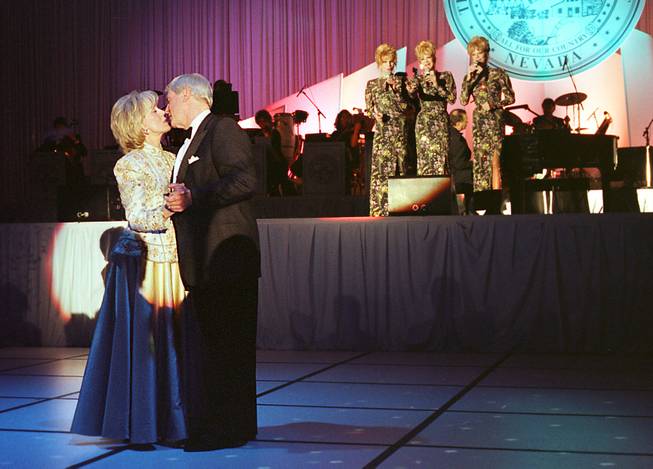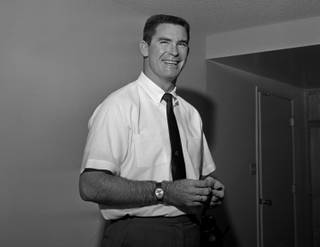
Gov. Kenny Guinn and his wife Dema steal a kiss during the first dance as the McGuire Sisters sing during the Governor’s Inaugural Ball at the MGM on Saturday, January 30, 1999.
Friday, July 23, 2010 | 2:01 a.m.
Kenny Guinn
If you were governor today, what would you do?
Kenny Guinn at a glance
Born Aug. 24, 1936, in Garland, Ark.
Moved to Nevada, 1964
Superintendent, Clark County School District, 1969 to 1978
President, Nevada Savings and Loan, 1978 to 1987
President and chairman, PriMerit Bank, 1987 to 1988
Chairman and CEO, Southwest Gas, 1988 to 1997
Acting president, UNLV, 1994 to 1995
Nevada’s 27th governor, January 1999 to January 2007
Board member, MGM Resorts International, May 2007 to present
Died Thursday, age 73
Survived by wife, Dema, and sons Jeff and Steve
About Kenny Guinn
"Like any governor, he faced adversity and controversy, but his people skills, substantive knowledge — aided by his business acumen — and down-to-earth approach to governing allowed him to leave office probably more popular than when he was sworn in as governor."
Paul Laxalt, former Nevada governor and U.S. senator
•••
"He would spend an hour and a half explaining the budget to you on a napkin. He cared about the state, and he cared about the people he met. It wasn’t phony. It was real, and you could feel it.”
Barbara Buckley, Assembly speaker
•••
"He answered the bell every time this state needed him. If it helped the state of Nevada, helped the community, he was always there to help lead the fight. He was Nevada’s prince.”
Greg Ferraro, friend and adviser
•••
"He’d say that, at the end of the day, he was always the son of dirt-poor sharecroppers who knew what it was like to wonder where your next meal was coming from. Every decision he made in state government was based on how it would affect the person struggling to make a living.”
Mike Hillerby, former chief of staff
•••
"He was passionate about Nevada and embodied the independent spirit of the Silver State, and he always put the needs of Nevadans first. He was also a gentle man who enjoyed people and made them feel special.”
Kristin McMillan, Las Vegas Chamber of Commerce chairwoman
•••
"Our state has always needed more Kenny Guinns, and now we have lost the only one we had.”
Brian Greenspun, Sun publisher and editor
•••
"Gov. Guinn stewarded Nevada through some of its most difficult budget times, and he did so with authority, but also with compassion.”
Steven Horsford, Nevada Senate majority leader
•••
"No one in the history of our state has rendered more elective and private-sector service than Kenny Guinn. He was a go-to guy. He was also the kind of guy that would be featured on the cover of Field and Stream.”
Richard Bryan, former Nevada governor and U.S. senator
•••
"He was a person who spent his entire life making Nevada a better place to live.”
Bob Miller, former governor
Years ago, on a flight from Reno to Las Vegas, Kenny Guinn found himself sitting next to a man from Washington state, a stranger, who began ranting about all that was wrong with Nevada, with no idea who he was talking to.
Guinn nodded his head a bit, laughed some, and then said: “Maybe I can fix some of that because I’m the governor.”
And because this was a governor who had no pretensions, no airs that might come with the office, the man from Washington felt comfortable to continue his complaining.
Nevada historian Michael Green, seated nearby, was bemused but not surprised by Guinn’s patience and willingness to indulge the stranger.
“One of the reasons that he was elected twice was that he just seemed like an average guy,” Green said.
Average, in an extraordinary way — inviting his political adversaries into the den of the Governor’s Mansion to work on the language of contentious bills, knocking back beers with legislators after work, taking schoolchildren on tours of the mansion even if it meant keeping politicians waiting for a meeting.
He opened touchy negotiations through the gentle force of his personality and closed the deals with the warmth of his handshake. And if he was guided by any one value, it was to improve Nevada’s future, starting with the education of its young citizens.
The state’s biggest initiative to encourage high school students to attend college carries his name — the Gov. Guinn Millennium Scholarship.
Guinn, 73, a moderate Republican who served two terms as governor after years in utilities, banking and education, died Thursday after falling from the roof of his home near Rancho Circle, where he was thought to be cleaning off pine needles. A heart attack was suspected, and the Clark County coroner’s office hoped to identify the cause of death today.
His passing seemed so unlikely because Guinn seemed so fit, so sturdy, so in command, so effective in everything he broached.
“No one in the history of our state has rendered more elective and private-sector service than Kenny Guinn,” former Nevada Gov. and Sen. Richard Bryan said. And then he added that Guinn was a man’s man, “the kind of guy that would be featured on the cover of Field & Stream.”
Other tributes came quickly from all corners of Nevada’s business, civic and political communities and all of them couched in words such as “shock,” “loss,” “prayers.”
If Guinn leaves one legacy, it is his success in focusing Nevada on education. He came to the governor’s office after having served as superintendent of the Clark County School District and interim president of UNLV, so there was no disguising his bias.
It was in 1999, his first year in office, that he pushed through what is widely considered to be his crowning gubernatorial achievement — the Millennium Scholarship. This program, financed with the help of money the state received from a tobacco industry settlement, gives high school students a financial boost to attend Nevada institutions of higher education. Winning bipartisan support to use tobacco funds to pay for the scholarships was classic Guinn. First he had to overcome the opposition of the state’s attorney general, a Democrat, who had argued that tobacco settlement money was earmarked for public health needs.
Assembly Democrats wanted only 25 percent of the settlement money to go for scholarships, the rest for health care. Guinn argued to a 50-50 split, and settled on getting 40 percent of the tobacco money.
Nearly 24,000 students have used the scholarship to attend UNLV alone.
Four years later Guinn found himself in his most acrimonious political adventure, pushing for various tax increases totaling a record $836 million to help deliver money to the state’s starved classrooms. Some Republicans called him a RINO — Republican in name only.
Guinn’s sticky wicket: Fifteen members of the state Assembly, all from his own party, opposed the tax increases and orchestrated a logjam, banking on the state constitution requirement for two-thirds approval for taxes.
Guinn argued from another point of view, that the constitution also required funding for education, which trumped the two-thirds rule. He took his argument to the Nevada Supreme Court and won. But with such contention over the issue, lawmakers felt hinky passing the tax bill with less than a two-thirds majority even with the court’s blessing.
The logjam finally broke when ranking Assembly Republican John Marvel joined four others from his party in aligning with the 23 Democrats to approve the taxes.
Guinn, a native of Garland, Ark., who moved to Nevada in 1964, had already made his impressions on the state before reaching the governor’s office.
He was an accomplished businessman, serving as chairman and president of PriMerit Bank, chairman and CEO of Southwest Gas, president of Nevada Savings and Loan and board member of Service1st Bank of Nevada.
As superintendent from 1969 to 1978, he helped prepare the School District for what would be unprecedented growth, such as putting some overcrowded campuses on double sessions while converting others to year-round schools.
On the civic front, he headed commissions that led to creation of Metro Police from separate Las Vegas and Clark County police departments and to stronger fire safety standards after the 1980 MGM Grand fire that killed 84 people.
As governor, Guinn pulled from his business acumen.
“He was extraordinarily helpful when I was governor in recruiting Citibank to Las Vegas, which has thousands of employees on Sahara (Avenue),” Bryan said. “He persuaded his colleagues in the banking industry that this would be very big for us.”
Likewise, Democrat Bob Miller turned to Guinn for help shortly after becoming governor in 1989.
“When I was governor and looked at ways to streamline the state budget process, it was Kenny Guinn who I turned to,” Miller said.
Guinn served as governor during one of Nevada’s most explosive growth periods, leading with a pragmatic streak and fierce determination to do what was right rather than what the more partisan elements in his party thought. And he would scoff at the RINO tag, pointing to fiscally conservative acts such as a $350 million reduction in spending when he first took office and privatizing the state’s workers’ compensation system.
His knowledge of budgetary details was legendary. He could be found in his office on weekends crunching numbers and cornered reporters to discuss financial issues until they begged off.
But like everyone says, Guinn was approachable, easygoing, an average Joe. In Carson City, he favored Adele’s, a fancy joint, and the gritty Old Globe, where he would tip back a long-neck Bud Light alongside others at the bar who had little notion of his rank.
Former Assembly Speaker Richard Perkins, a Henderson Democrat, called Guinn a consummate gentleman.
“He didn’t play partisan politics,” Perkins said. “He had a great love for the state and that’s what drove him. I remember a lot of times sitting in the den at the mansion and that’s the way we worked things out.”
In 2005, Time magazine named Guinn one of the nation’s five best governors.
“Guinn managed to put Nevada’s long-term fiscal health above his own or his party’s political considerations,” the magazine wrote. “That’s a risky gamble for any politician. But with his approval numbers back near 60 percent, Guinn has gone a long way in showing that it can pay off in the end.”
Former Republican Gov. Robert List said Thursday: Guinn “optimized public service at its best — as an educator, as an elected official and as a citizen. He will be remembered as an energetic straight shooter, a strong and honest leader and as a great governor.”
Guinn is survived by his wife, Dema, whom he married in Reno in 1956, and sons Jeff and Steve.
Sun reporters Emily Richmond and Anjeanette Damon contributed to this story.

